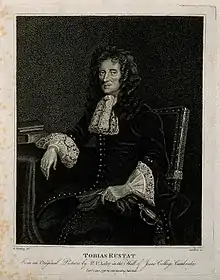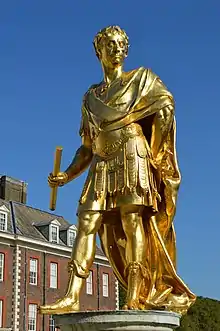Tobias Rustat
Tobias Rustat (1606?–1694) was a servant to Charles II and benefactor of the University of Cambridge. He is remembered for creating the first fund for the purchase of books at the Cambridge University Library. The Rustat Conferences based at Jesus College, Cambridge were named after him.

Life
He was born at Barrow upon Soar, Leicestershire, where his father Robert was vicar.[1] After an apprenticeship to a barber-surgeon in London, Rustat entered the service of William Feilding, 1st Earl of Denbigh, before becoming servant to George Villiers, 2nd Duke of Buckingham. An ardent Royalist, he acted as a courier between England and the exiled court. During the Second English Civil War, Rustat joined Buckingham in an uprising in Kent, where he saved the Duke's life. In 1648 he escaped to the continent with Buckingham. He was present following the Battle of Worcester (1651) and aided Prince Charles's escape.[2]
In 1650 Rustat was made Yeoman of the Robes to Charles II, remaining in the position until the king's death in 1685. Rustat's initial personal wealth came from his career as a courtier in the mid-17th Century. He added to his wealth when he became an investor in a series of trading companies including the Royal African Company. Historian William Pettigrew has stated that this company “shipped more enslaved African women, men and children to the Americas than any other single institution during the entire period of the transatlantic slave trade.” and that investors in the company were fully aware of its activities and intended to profit from this exploitation.[3]
Rustat is buried in the chapel of Jesus College, Cambridge where there is a monument to him.
Benefaction

In later life Rustat became an important benefactor to a number of colleges of the University of Cambridge, in particular to Jesus College where his father had been a student.[4] In January 1667 he created the first fund for the purchase of books at the Cambridge University Library with a donation of £1000.[5] The books purchased from the fund were to be stamped with Rustat's crest.[6]
Rustat also created a scholarship at Jesus College for the sons of deceased Anglican clergyman. Among the Rustat scholars was Samuel Taylor Coleridge.[4]
He was awarded a Master of Arts degree per literas regias in 1674.[7]
Rustat commissioned three statues of Stuart kings from the workshop of Grinling Gibbons in the 1670s and '80s. These were the standing statue of Charles II at the Royal Hospital Chelsea, an equestrian statue of Charles II in Windsor Castle and the statue of James II, now in Trafalgar Square. The last was commissioned for the Palace of Whitehall, apparently at the same time as the standing Charles II, and the two works might have been intended as pendant pieces.[8]
His portrait was painted by Peter Lely and Godfrey Kneller. Jesus College commemorated him in the naming of Rustat Road in Cambridge.[9] In 2020 the Rustat Conferences were renamed the Jesus College Conferences and the College has proposed that his memorial should be removed from the chapel.[10]
References
- "Rustat, Robert (RSTT581R)". A Cambridge Alumni Database. University of Cambridge.
- . Dictionary of National Biography. London: Smith, Elder & Co. 1885–1900.
- https://www.jesus.cam.ac.uk/articles/legacy-slavery-working-party-recommendations
- Garrett, Martin (2004). Cambridge: A Cultural and Literary History. ISBN 1-902669-79-7.
- Oates, J. C. T. "The seventeenth century". A brief history of the collection. Cambridge University Library. Retrieved 1 April 2015.
- "Binding stamp of Tobias Rustat". St John's College, Cambridge.
- "Rustat, Tobias (RSTT675T)". A Cambridge Alumni Database. University of Cambridge.
- Ward-Jackson, Philip (2011), Public Sculpture of Historic Westminster: Volume 1, Public Sculpture of Britain, Liverpool: Liverpool University Press, pp. 291–3, ISBN 9781846316913CS1 maint: ref=harv (link)
- Gray, Ronald (2000). Cambridge Street Names. Cambridge University Press. p. 46. ISBN 0-521-78956-7.
- "Legacy of Slavery Inquiry update: proposed relocation of Rustat's memorial". Jesus.cam.ac.uk. Jesus College, Cambridge. Retrieved 10 November 2020.